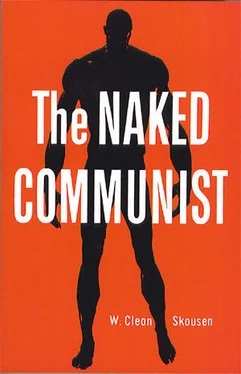In spite of this determination to be “moderate,” however, it was not long before the true feeling of Marx rumbled to the surface. He was concerned about two things: first, the need to create a hard core of disciplined revolutionists who could inflame the workers of the major industries in all countries with a will to act, and secondly, the need to eliminate any who might threaten Marx’s leadership in this new movement. What Marx was contemplating was a party purge.
The first to feel the force of the new campaign was the German labor leader, Herr von Schweitzer. All students of Marx and Engels seem to agree that both of them were completely without mercy when it came to dealing with a comrade who was marked for party liquidation. The broadside of propaganda which they launched against Schweitzer alleged that he was working for Bismarck, the Iron Man of Germany. Although this was pure fabrication, nothing would have been more devastating to Schweitzer’s reputation. Even today some historians use Marx’s charges as a basis for the claim that Schweitzer was a traitor to the cause of labor.
Another party pillar to fall under the purge was Mikhail Bakunin, the first Russian to become interested in revolutionary activities. He escaped from a Russian prison and had taken up residence in Geneva. Bakunin became so enthusiastic in advocating Marx’s principles that certain elements of the labor movement began gravitating toward his leadership. This was fatal. Marx immediately set out to destroy him. The technique was the same as that used against Schweitzer except that Marx and Engels charged Bakunin with being an agent of the Russian Czar. This had a ruinous effect for awhile. Then they spread a charge which later proved to be completely false—that Bakunin had embezzled 25,000 francs. Finally, to administer the coup de grace, Marx succeeded in getting the International to oust Bakunin from the Association. By this act Marx secretly felt he had destroyed the last man who might seriously threaten his leadership. What Marx did not know was the fact that in spite of this abuse, Bakunin would remain loyal to Marx’s precepts, even translate Marx’s books into Russian and thereby plant seeds which would ultimately bring the first nation in the modern world under a Communist dictatorship.
However, Mark’s anxiety to purge the International of all his personal enemies created such violent suspicion, distrust and party dissension that it brought about the organization’s total destruction. In fact, the end of the First International came close on the heels of Bakunin’s expulsion. The trade unions in England began to abandon the cause of international revolution and the workers’ groups on the Continent began ignoring the mandates of the Association. Finally, on September 8, 1873, the last congress of the International Workingmen’s Association was held at Geneva and Marx found that the thirteen delegates who finally agreed to attend had to be practically “dug up out of the ground.” For all practical intents and purpose, the First International was dead.
Marx Writes a Book to Change the World
Much of Marx’s motivation in trying to make the International Workingmen’s Association a great world movement was his desire to put into practice the very theories he was struggling to put down on paper. For several years he had pampered his two pet projects—the International and his “book.” Both projects drained him of his normal physical strength. This permitted an old liver ailment to flare up again and before long he was suffering from a rash of boils which threatened to cover his entire body. Ill health was to plague him the remainder of his days. In a letter to Engels he poured out his complaints against the pain and disappointment he was suffering:
“To my extreme disgust, after being unable to sleep all night I discovered two more first-class boils on my chest.” Later he wrote, “I am working now like a drayhorse, seeing that I must make the best use of all the time available for work, and the carbuncles are still there, though they are now giving me only local trouble, and are not interfering with my brain.” After a particularly severe attack he wrote: “This time it was really serious—the family did not know how serious. If it recurs three or four times more, it will be all up with me. I have wasted amazingly, and am still damnably weak, not in the head, but in the trunk and limbs…. There is no question of being able to sit up, but, while lying, I have been able, at intervals, to keep digging away at my work.” {8} 8 Ruhle, Otto, Karl Marx , pp. 262.
The “work” to which Marx refers was the research and preparation of the first volume of Capital . Marx was convinced that a revolution would never succeed unless the working masses had a revolutionary philosophy of history, economics and social progress. He wrote Capital in order to show why the violent overthrow of the present order was not only justified but inescapable. Elsewhere, we shall examine the theories of Marx, but at this point it is sufficient to point out that Marx looked upon the writing of this book as an unpleasant mission which had to be completed before international communism could germinate and flourish.
During 1865, when Marx was striving to prepare a final copy of his first volume for the printer, he told Engels he wanted to “finish it off quickly, for the thing has become a perfect nightmare to me.” He occasionally enjoyed periods of respite from his illness and finally wrote to Engels: “As regards the damned book, this is how the matter stands. It was finished in the end of December.” Engels assured Marx that the pain and suspense of getting the book completed were as great a trial to him as they were to Marx. He wrote: “The day the manuscript goes to press, I shall get gloriously drunk!”
It was not until March, 1867, that all the revisions were finally completed and Marx set out for Germany to have the book published in his native tongue. In a short time it began to be distributed.
But when Capital appeared in the book stalls it was far from the literary triumph which Marx and Engels had both expected. Its line of reasoning was entirely too finely drawn for the working masses and far from persuasive among intellectual reformers. It remained for the intellectuals of another generation to make Capital the principal excuse for their attack on the existing order of things.
By 1875 Marx had little satisfaction to draw from his life of struggle. The International had disintegrated around him and the book which was written to justify his policies was gathering dust in the bookstores across the Continent. Marx continued writing two more volumes but the flame was going out in him. After Marx’s death, it would remain the task of Engels to publish the second volume in 1885 and the third volume in 1894.
The closing years for Karl Marx were sterile, lonely ones. In abject defeat he turned to the bosom of his family. Always there would be Jenny to give comfort and consolation. But the Marx children bore the scars of their upbringing. When Marx interfered with the courtship of his daughter, Eleanor, she entered a free-love union with Edward Aveling and, following a most wretched existence with him, committed suicide. Another daughter, Laura, married a renegade doctor and later died with him in a suicide pact.
By 1878 Marx had abandoned practically every aspect of his work. His rock-ribbed self confidence had been shattered. Labor leaders ignored him, reformers ridiculed him. His words carried little weight, either at home or abroad.
Thus, his morale was at the breaking point when the toll of time struck down his only kindred spirit outside of Engels—Frau Marx. This gentle, aristocratic and long-suffering companion died of cancer December 2, 1881. Thirteen months later, Marx’s favorite daughter, Jenny, also suddenly died. Thereafter, Engels noted that Marx, the man, was as well as dead. He survived his daughter, Jenny, by only two brief months. On March 14, 1883, at 2:45 in the afternoon, he died while sitting alone in his chair.
Читать дальше











